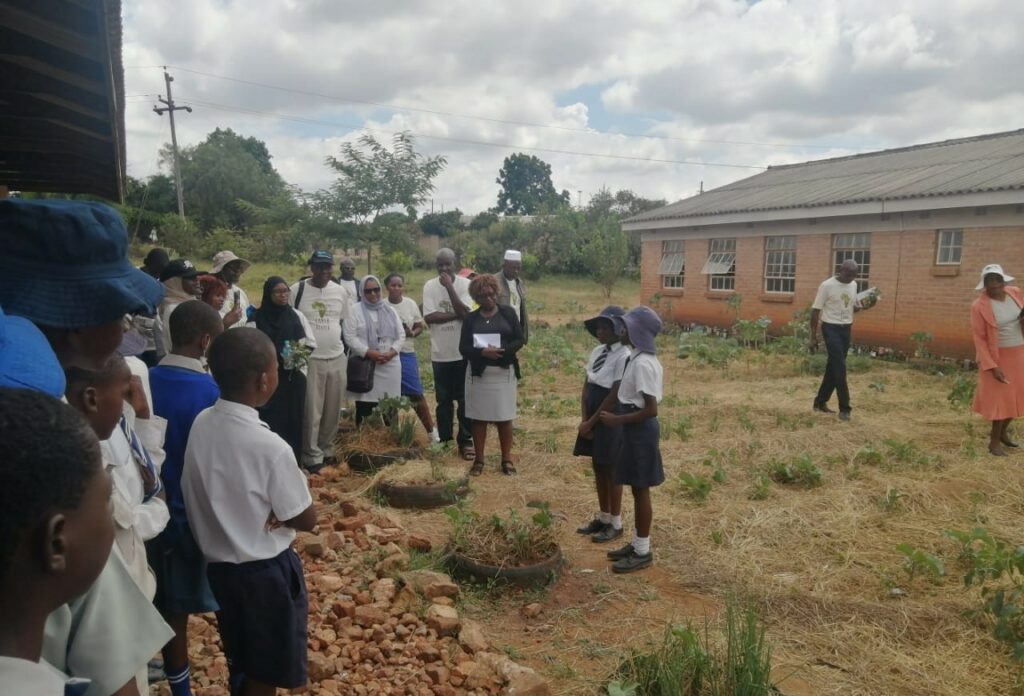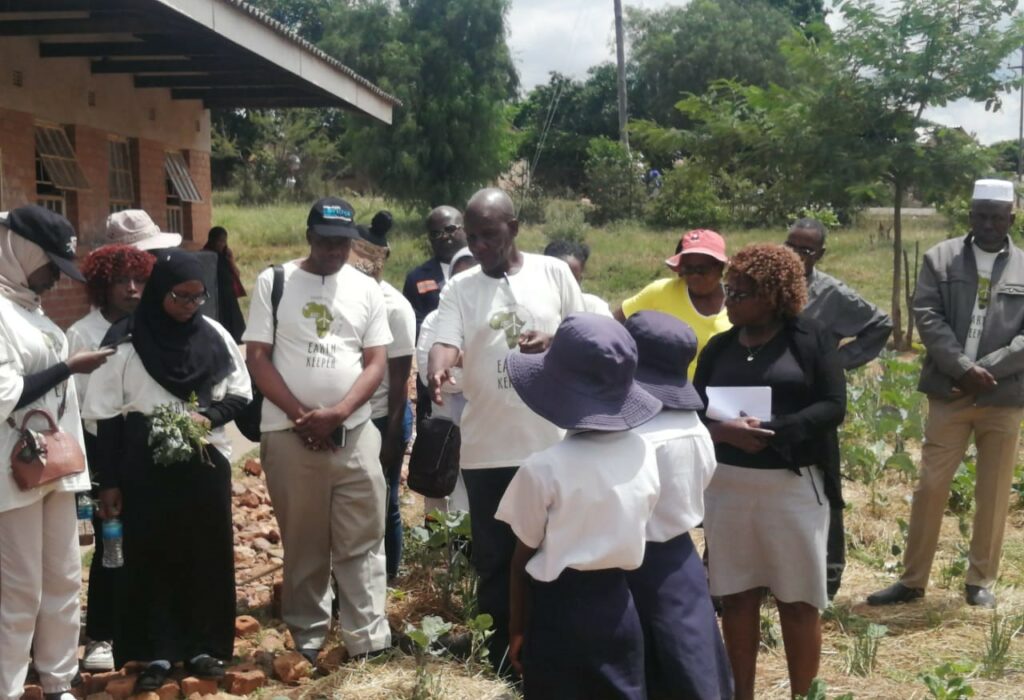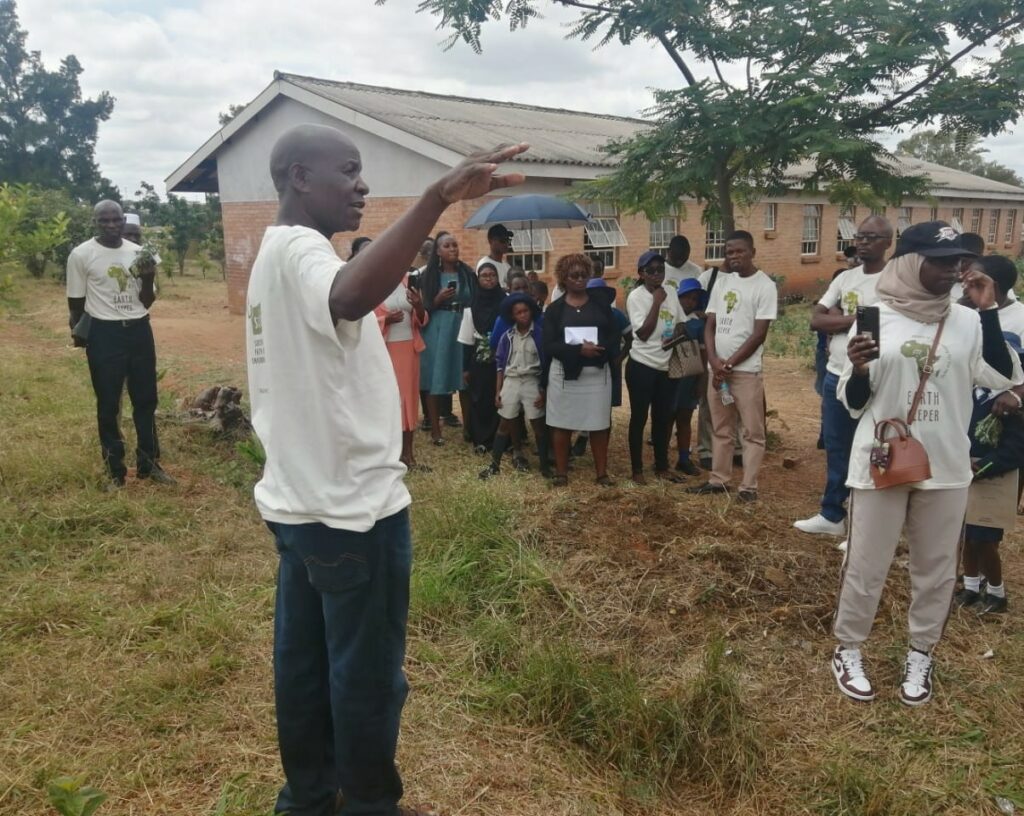The Power of a Functional Food Garden: The Case of Mgombane Primary School
- Published:
 Mgombane Primary School learners explaining to FLEAT members how they take care of the vegetable garden in front of their classrooms
Mgombane Primary School learners explaining to FLEAT members how they take care of the vegetable garden in front of their classrooms
From the outside, the unassuming school does not resemble the green well-manicured gardens that are usually associated with educational institutions. The trees that populate the grounds are different from the usual decorative trees associated with most schools. There are indigenous chickens that are running around the school grounds and in between the classrooms there is a total ground cover from the dry grass that mulch the vegetable gardens. Trenches connect the rooftop runoff to the healthy indigenous fruit trees that have taken residency on the grounds of Mgombane Primary School in Bulawayo, Zimbabwe.. Soil erosion is at its weakest in this school, the learners are well versed with the goings on and are proud to be associated with this uniquely designed school setup. They are constantly reminded of their place in the creation’s scheme of things.
Thirty participants and three facilitators from our Faith Leader Environment Advocacy Training (FLEAT) Zimbabwe II workshop in Bulawayovisited one of the ten unique schools. The participants were exposed to the integrity of creation and the call to stewardship for creation. They had specifically discussed food and the need for its production in a manner that would allow for biodiversity to thrive. The participants were encouraged to adopt climate-friendly agroecology in the production of food. The participants also explored the impacts of genetically modified foods on health, nutrition, and their impact on the environment. The typical healthy production methods were shared and there was a focus on having an organic garden that would encompass growing organic crops in a balanced manner and these gardens would incorporate vegetables, trees, and herbs. The encouragement was to; grow your own food, prepare your own food and eat your own food. The participants also detailed indigenous foods that are grown in their region of origin that they grew up producing or harvesting and formed a critical part of their diet. The participants were divided into four groups and focused on four items that they explored from production to harvesting, storage, and preparation for consumption and they also outlined their nutritional values as well as medicinal properties.
 FLEAT Zimbabwe 2 members at Mgombane Primary School in Bulawayo, Zimbabwe
FLEAT Zimbabwe 2 members at Mgombane Primary School in Bulawayo, Zimbabwe
Mgombane Primary School situated in the Nkulumane high-density suburb is a thriving agroecological and permaculture institution. It has learners who come together with teachers and some local community members to create a food-producing institution. The philosophy used is that the school ground must be fully utilised to provide for the school children’s food needs and the school club facilitated by one FLEAT Zimbabwe II member Mr. Dingani Ndlovu with the planting of indigenous fruit trees, edible herbs, and vegetables has given life to the philosophy. They keep free-range chickens and rabbits that have a symbiotic relationship with the fruit trees, herbs, and vegetable gardens. The children are taught the importance of growing their own food and also keeping the environment well preserved. The herbs are prepared and sold to the local community as well as other institutions. The children also benefit from the herbs as most of them have both curative and preventative properties. The fruits and vegetables are organic and cater to the additional nutrition needs of the learners.
 Mr. Dingani Ndlovu, a FLEAT member explaining the permaculture process at Mgombane Primary school in Bulawayo, Zimbabwe
Mr. Dingani Ndlovu, a FLEAT member explaining the permaculture process at Mgombane Primary school in Bulawayo, Zimbabwe
The children who participate in the permaculture project are said to be more confident and more environmentally conscious than those that are not part of the club. The school is laying a good foundation for the learners as far as food and nutrition are concerned. The school embodies a great sociocultural environment that develops the learners fully in the value of a balanced biodiversity. The FLEAT Zimbabwe II members learned a lot and also got seeds and cuttings for use to start their own permaculture gardens.
By Gabriel Manyangadze
Who we are

SAFCEI (Southern African Faith Communities’ Environment Institute) is a multi-faith organisation committed to supporting faith leaders and their communities in Southern Africa to increase awareness, understanding and action on eco-justice, sustainable living and climate change.
Featured Articles
-

South Africa: Who Ends Up Paying If DMRE Cooks the Price of Nuclear Power?
-

South Africa’s nuclear energy expansion plans continue to draw criticism, environmental NGOs chew over legal challenge
-

Earthlife Africa and SAFCEI respond to latest unsettling nuclear news regarding the ministerial determination
-

Open Wing Alliance Africa (Virtual) Summit 2023
-

The Green Connection and SAFCEI respond to energy minister's divisive and deflecting comments
-

Job Vacancy: FLEAT Coordinator







